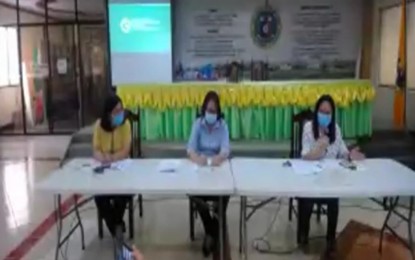
COVID-19 TESTING. Dr. Stephanie Abello (right), chief pathologist Western Visayas Medical Center sub-national laboratory in Iloilo City’s Mandurriao District, says on Thursday (June 11, 2020) the region’s coronavirus disease 2019 (Covid-19) testing backlogs are caused by the influx of repatriated overseas Filipino workers and traced contacts of Covid-positive patients. The laboratory has a seven-day turnaround time or will release the results seven days after the sample was submitted. (Photo courtesy of DOH-6)
ILOILO CITY – The Western Visayas Medical Center (WVMC) sub-national laboratory on Thursday said the arrival of repatriated overseas Filipino workers (OFWs) and the traced contacts of confirmed coronavirus disease 2019 (Covid-19) cases cause the backlogs in test results.
On Thursday’s press conference aired live at the official Facebook account of the Department of Health-Center for Health Development in Western Visayas (DOH-CHD 6), Dr. Stephanie Abello, the chief pathologist of Western Visayas Medical Center (WVMC) sub-national laboratory, said it can release the result seven days after the submission of a specimen.
As of 8 a.m. on Thursday, she said the laboratory has received 17,481 samples for reverse transcription-polymerase chain reaction (RT-PCR) testing since March 23.
Of this number, 14,456 were already released, leaving the laboratory with 3,025 samples to process.
More or less 600 results are expected to be released by WVMC on Thursday and the remaining 2,000 samples more or less are considered backlogs, she said.
The laboratory acquired on May 20 a new automated Ribonucleic Acid (RNA) extraction machine expected to hike its testing capacity from 500 to 1,000 daily.
“But eventually, during validation, the PCR (machine) did not match the automated RNA extraction so we went back to the manual 500 (daily) target,” she said.
“Due to the influx of the repatriates and the contact tracing associated with the positives, it (samples) adds (up),” she said.
The laboratory also stopped its operation for two days starting May 29 due to the damage at the negative pressure room, which ensures that the pathogens will not spread outside the laboratory.
The two days of non-operation has also contributed to the backlogs, she said.
“Our target now is within seven days, we can release (the results),” she said.
Abello said they requested another automated RNA extraction machine and another RT-PCR machine that could match.
“We can have a higher yield and faster turnaround time,” she said.
The region as of Thursday has 4,078 repatriated OFWs since the first batch arrival on April 9.
Based on the regional health office’s data, 50 of the repatriates or 1.2 percent were tested positive for Covid-19.
As of June 9, the regional health office has already traced and assessed a total of 1,193 contacts of 125 confirmed cases.
Aside from the WVMC sub-national laboratory, the Teresita Jalandoni Provincial Hospital in Silay City, Negros Occidental has also started running Covid-19 test last June 2. (PNA)
